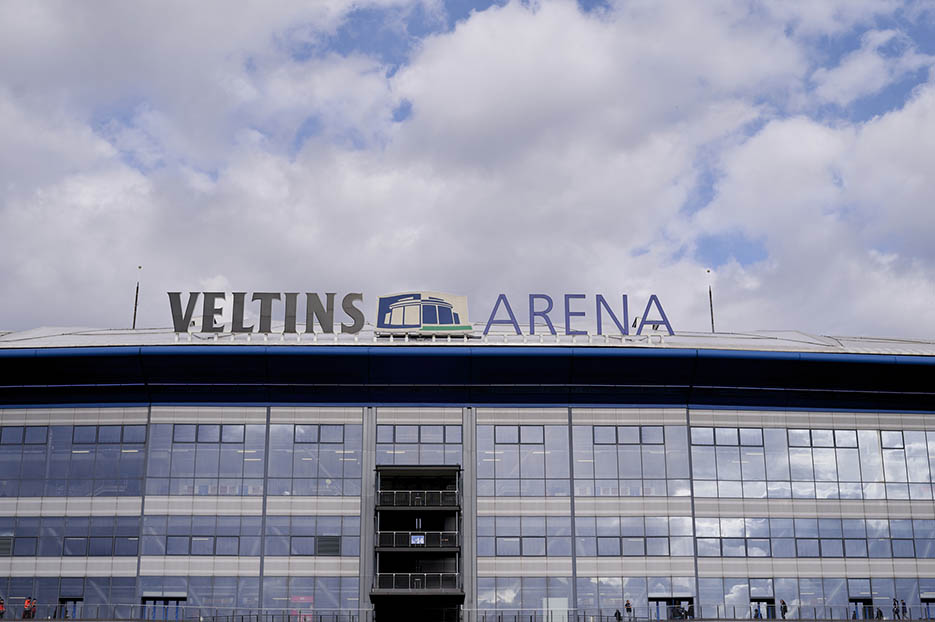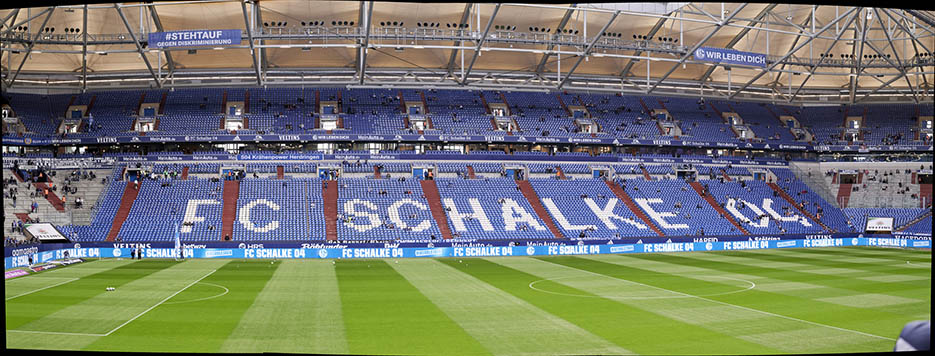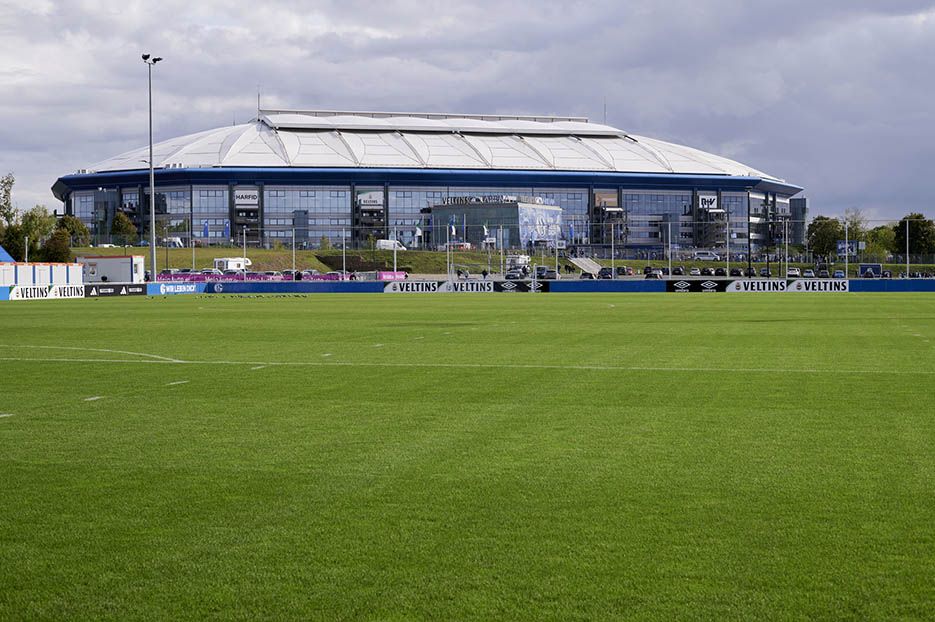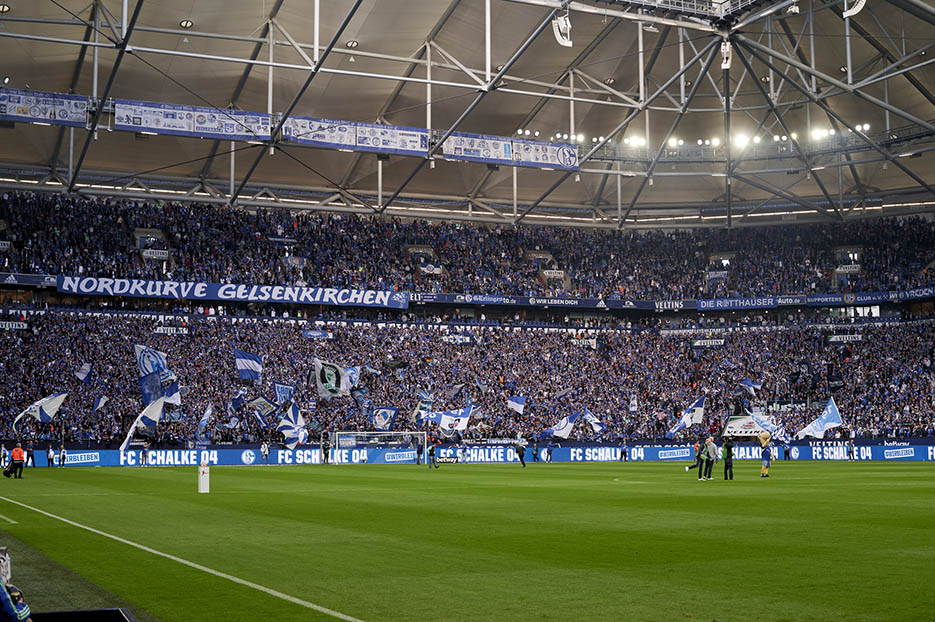Frankfurt Arena Complete Guide - Furnace Too Hot for the City
One of the Bundesliga’s most fiery stadiums will host the 2024 EURO matches - check out all you need to know in this Frankfurt Arena Complete Guide.

A ground of 62,271 spectators that has enjoyed Champions League Tuesday nights, as well as suffered the echoing gloom of second-division football. One of two homes to one of the most fierce derby rivalries in German football. The fourth-biggest ground in the Bundesliga that has been waiting for a title since 1958! Yet this is not why we compared Schalke 04’s stadium to a mine, as you’ll learn - and more - in this Arena AufSchalke complete guide!

Of course, the Arena AufSchalke is the name UEFA name for the Veltins-Arena, the engineering and atmospheric marvel of Gelsenkirchen. The stadium can't bear the name of its usual sponsor for the UEFA competitions, including the Euro 2024 in Germany.
The city of Gelsenkirchen will host four games of football at the Euro 2024!
Arena AufSchalke will be a host to one derby of the group stage, or possibly two in case Greece wins the Play-Off Path C bracket.
- Serbia v England (Sunday, 16th June, 21:00) in Group C
- Spain v Italy (Thursday, 20th June, 21:00) in Group B
- Play-off Winner C v Portugal (Wednesday, 26th June, 21:00) in Group F
One game of the knockout stages will be played at the Arena AufSchalke.
- 1st from Group C vs 3rd best from groups D, E, or F (Sunday, 30th June, 18:00) round of 16
Schalke is a neighborhood of Gelsenkirchen, the 25th most populous city in Germany with 262,528 citizens and it's located in the North Rhine-Westphalia state. With the name of the club - and the part of the city where it originated from - derived from Westphalian dialect and translates to "shaft" or "adit" with the latter meaning a horizontal entrance to a mine.
Scahlke’s stadium, however, hasn't been a part of the city-central Schalke neighbourhood for a while now. It’s located in the north of Gelsenkirchen.
Veltins-Arena was built in 2001, and yet it still remains one of the biggest engineering marvels of sports stadiums anywhere.
But Schalke 04 has been out of the Schalke neighbourhood even before that, as their previous home Parkstadion is located quite close to its new arena.
After Schalke 04's major 1997 triumph in the UEFA Cup, and the club's upcoming 100th anniversary in 2004, the plans for a new stadium were greenlit in 1998.
The construction cost of the Arena AufSchalke has come down to €191,000,000! Which is a sum that will look as a magician's feat after you find out about it more.
As this entire area, including the club obviously, is defined through its mining history, so was the stadium.
Two mine shafts of the nearby coal mines run directly beneath this field at a depth of 800 metres. These holes in the earth would've caused unwanted shifts and tensions that could have compromised the structural integrity of the stadium.
To avoid any potential issues, the stadium was rotated from the classic north–south arrangement to a northeast–southwest alignment.

As it is a category 4 UEFA stadium - the highest category - some major matches were played here.
Arena AufSchalke hosted the memorable 2004 Champions League final between Monaco and Porto, which the Portuguese side won 3:0 with Jose Mourinho in charge. Launching his career stratospheric.
Arena AufSchalke also hosted five matches at the 2006 FIFA World Cup, including a quarter-final. The famed match between England and Portugal in which tensions were high but the Portuguese went through after penalties.
The arena, due to its engineering possibilities, also held the 2010 Ice Hockey World Championship. The tournament's opening game between Germany and the United States was held here to a crowd of 77,803 - a record for ice hockey attendance!
Schalke's home ground - Arena AufSchalke, has a capacity of 62,271 (standing and seated) for league matches and 54,740 (seated only) for international games.
However, for the 2024 Euros, the stadium's capacity of Arena AufSchalke is set at 50,000!
The stadium has two tiers which are separated by 72 VIP lounges that form a ring around the entire stadium. On the Western grandstand, the VIP capacity is increased by a second level of lounges directly beneath the main belt.
The whole stadium is built in line with the area's history.
The foundation for the Arena AufSchalke was made out of cast concrete and 600,000 cubic metres of packed slag, a waste product from the steel smelting industry.
Leading into the four corners of the ground are 4.50 by 4.50 metres tunnels, which serve as access for construction and as ventilation for the interior.

There are two main engineering aspects of the Arena AufSchalke.
1. Firstly, the first retractable roof in Germany, which can completely cover the pitch area. Making the arena suitable for indoor sports like ice hockey and for concerts.
To reduce the noise production that rams up to 105 decibels during concerts, a second layer of Teflon-coated fibreglass canvas was added over the first, creating a noise-suppressing air cushion.
With the roof looking like a spiderweb on top of the mine's exit from the inside.
2. Arena AufSchalke also boats a slide-out pitch! Supported by an 11,400-tonne mechanical substructure, the playing field can be moved in and out of the stadium within four hours.
This has several benefits. Primarily this way the grass gets what it needs the most: sun, air, and water.
Additionally, with the ability to pull out the pitch, it doesn't get damaged during the concerts.
The outside area where the field is drawn out to can be used as parking facilities for buses during football matches when the pitch is in its house.
But for those who are interested in more of the emotional side of football grounds, the Schalke 04's stadium tunnel is the main attraction. As it is done in a way to reproduce and honour the mineshafts that made this city and that its many inhabitants used daily for decades.
While Gelsenkirchen is not the industrial city it once was, this is a brilliant way of remembering the past. As well as signalling or reminding the players as to who and what are they representing.
Additionally, the stadium also has a chapel inside of it, where thousands of weddings and christenings have been conducted.
Arena tours last around 75 minutes and are led by trained stadium guides. Admission also includes access to the Schalke Museum.
Unlike other stadium and city guides we did for the Euros, like Berlin and Munich, Gelsenkirchen is not a million-person city.
Gelsenkirchen was first documented in 1150, but it remained a tiny village until the 19th century when the Industrial Revolution led to the growth of the entire area. The city's population increased from 6,000 in 1840 to 140,000 in 1900!
Gelsenkirchen has one of the coolest nicknames of cities everywhere. Once again stemming from its mining history. Gelsenkirchen was called the "city of a thousand fires" for the flames of mine gases flaring at night.
The city is located in the Rhine-Ruhr Metropolitan Region, an area with several urban concentrations. Leaving little nature in between the cities and towns, making it hard for everyone but the locals as to where one city starts and another begins.
For instance, the distance between Schalke's home and that of their bitter rivals Dortmund, the Signal Iduna Park, is just 27 kilometres away.
The closest major city to Gelsenkirchen is Essen, which has twice the number of citizens.
Dusseldorf Airport is the closest to Gelsenkirchen and is located about 40km southwest of the city.
From there, the RE2 and RE3 train lines offer a direct connection to Gelsenkirchen Central Station which will take you approximately 35 minutes.
Gelsenkirchen Central Station is the city’s main local and long-distance transport hub and is located in the city centre. Some 6 kilometres from the Arena AufSchalke.
You can also come to Gelsenkirchen by long-distance buses. The central coach station, ZOB Altstadt, is right by the main train station.
There are three tram lines, one light rail line, and about 50 bus routes in Gelsenkirchen.
U-Bahn, tram and bus lines provide great access to the districts of Altstadt, Buer, and Horst.
Trams 302 and E302 lead to the Arena AufSchalke. While there will be specific shuttles organized during the tournament.
Hostels range from €24 a night, rental apartments from €52 a night, hotels are a bit more expensive at €87 per night.

As it is a smaller city, Gelsenkirchen doesn't provide as many options as other places do. For football fans, the Parkstadion - former ground of Schalke 04 - is located just 330 metres north of the Veltins-Arena.
Secondly, as is seemingly everything in Gelsenkirchen, the sights are also mine-related. Like the Halde Rungenberg and Stockpile Rheinelbe stockpiles of mining residue that are turned into vistas and tourist attractions.
They are a part of the Industrial Heritage Trail tourist attraction with museums and exhibitions that link the Ruhr area.
City's most recognizable building is the Musiktheater im Revier, located centrally.
Nordsternpark will be transformed for the EURO 2024 Festival to host the Fan Zone. It is located around four kilometres southwest of the Arena AufSchalke.
- Nordsternpark, Am Bugapark 1, 45899 Gelsenkirchen
Zoom Erlebniswelt zoo is one of the most popular in Germany and is located 3.3 km from Arena AufSchalke.

One of the Bundesliga’s most fiery stadiums will host the 2024 EURO matches - check out all you need to know in this Frankfurt Arena Complete Guide.
The Stuttgart Arena complete guide will maximize your enjoyment for the upcoming Euro 2024, and prepare you with all the interesting and important tidbits.
The Leipzig Stadium guide will get you up to speed with everything you need to know for the Euros 2024. But also for visiting the Red Bull Arena otherwise.
BVB Stadion Dortmund complete guide will have you geared up and completely ready for the ultimate EURO 2024 experience in one of Germany's best football cities.
Discover everything you need to know about the Munich Football Arena, in order to have the best experience at the Euro 2024 or anytime visiting the Bavarian cap